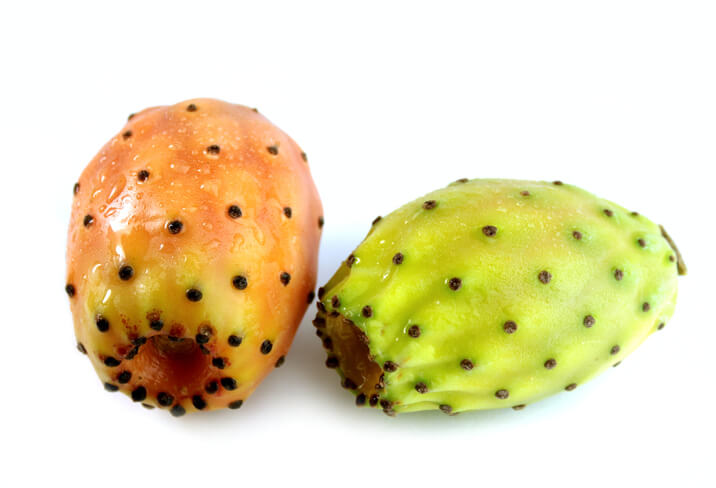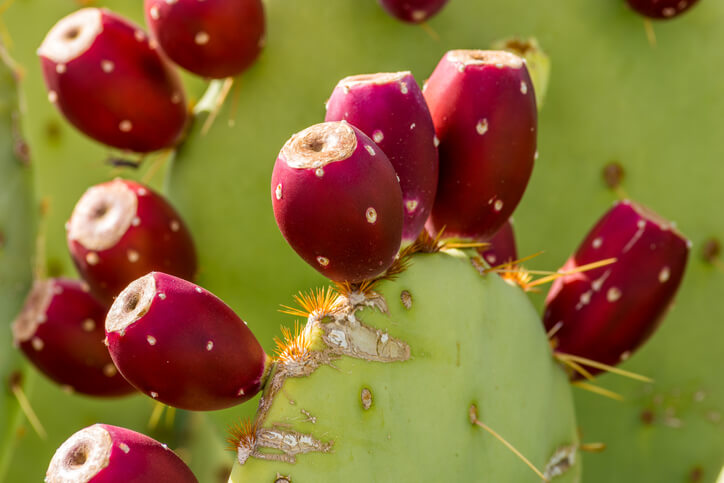Prickly Pear Juice May Be the Perfect Summer Beverage
6 years ago | Nutrition
By Joy Stephenson-Laws, JD, Founder
For most of us, cactus may not be a staple food in our diets. Some people may not know that cactus is even edible. But it is!
“These spiny, hairy, succulent plants have many uses in native cultures, from religious and medicinal to culinary applications. The stems and flat leaves of some cactus varieties are eaten, while other cactus species produce edible fruits that are harvested for their sweet, sour or decorative characteristics,” according to one source.
“There are many different kinds of cactus fruit, none of which is poisonous; however, some are so sour or bitter that they are not considered edible.”
A popular cactus for consumption is the prickly pear, also called nopal. The nopales are the pads of the cactus (the flat round green things with the spikes on them), and then there is the pear of the cactus (the fruit the prickly pear cactus grows).

It is recommended to eat the cactus pads when they are young, because they get very tough as they age.
“Nopal cactus is a common ingredient in foods in some regions of Mexico. There are several ways to use nopal cactus, including in jellies and candies and as an aid to help harden plaster. There are also a number of medicinal uses, thanks to this cactus’s varied health benefits,” according to one source.
Some claim that the sap from the pads makes a great mosquito repellent and can help heal scrapes and burns.
Now the prickly pears, (scientific name is Opuntia), are great for making juice. In this video, a blogger goes through the steps on how to make your own prickly pear cactus juice. The pears make a beautiful, bright reddish colored juice which she says tastes like “sweet cucumber and watermelon juice.”
Sounds pretty tasty, right?
The flesh of the prickly pear can also be eaten raw, roasted, grilled or broiled.
(You can grow your own prickly pear cactus or perhaps buy this plant at your local farmers’ market, a Mexican food market or a specialty food store).
It has been reported that consuming all parts of the prickly pear cactus have such great potential health benefits, that this plant should be considered a superfood. It’s rich in essential vitamins and minerals we all need to stay healthy, including vitamins C, E and A, iron, calcium, potassium, magnesium, fiber and more.
Let’s get into some of the specific potential benefits of consuming prickly pear cactus:
- The fiber in prickly pears may help with multiple metabolic issues and more.
“Prickly pears are a good source of soluble fiber in the form of pectin, as well as the insoluble fibers cellulose and lignin. A diet rich in soluble fiber may help control blood cholesterol levels and decrease the risk of diabetes. Insoluble fiber intake can regulate bowel movements and may lower your risk of digestive disorders such as colon cancer,” according to this source.
- Prickly pear cactus may be good brain food, literally!
The Medical Daily report discusses how some researchers believe that the anti-inflammatory properties of this cactus may help protect brain cells by reducing free radical damage.
“Quercetin, (+)-dihydroquercetin, and quercetin 3-methyl ether were all found effective at protecting isolated rat brain cells, because they’re all active antioxidants, according to a 2003 study. It’s possible the nopal cactus possesses this brain protective effect through antioxidative flavonoid activity, meaning it prohibits the formation of free radicals in brain cells.”
This may help reduce issues such as dementia and depression.
- Have a hangover? Prickly pear cactus may help.
I always advise that if you drink, do so in moderation, however, sometimes we can all go overboard (especially during all of the summer festivities). If you really want to be proactive about preventing the dreaded hangover, consider having some prickly pear cactus juice before you even start drinking.
This report discusses a study in which researchers found evidence that when adults consumed prickly pear fruit extract before drinking alcohol, they suffered less severe hangovers.
The study involved 55 healthy adults. Some of the participants were given prickly pear fruit extract, and some were simply given a placebo five hours before they consumed alcohol. Participants were given a “standard meal” and then spent four hours drinking their choice of vodka, gin, rum, bourbon, scotch or tequila, according to the report.
The researchers found that the drinkers who had the prickly pear extract had less severe hangovers. For example, they had less nausea, dry mouth and loss of appetite.
Furthermore, the participants who had the prickly pear extract, “...had lower levels of C-reactive protein, which is produced by the liver and is linked to inflammation, than the control group did.”
- Prickly pear cactus may help control your blood sugar.
“The fiber and pectin [a starch also found in apples ] decrease blood sugar by minimizing sugar absorption in the stomach and intestines. It also protects the liver from oxidation by improving insulin sensitivity,” (Medical Daily).
- Prickly pear cactus may help with an enlarged prostate.
Having an enlarged prostate is actually pretty common in men over the age of 50. This condition can cause annoying symptoms such as urgency to urinate, straining to urinate and continued dribbling of urine.
The National Institutes of Health (NIH) discusses how consuming cactus flower extracts may help. More research is needed, but this may have to do with its anti-inflammatory properties.
This source says prickly pear cactus in particular may help with an enlarged prostate.
Precautions & Dangers?
Overall, prickly pear cactus appears to be safe, however, if you are taking it in medicinal or extract form, you should seek the advice of a competent healthcare professional. Click here to see the possible side effects and warnings. Those who are pregnant or breastfeeding, have diabetes or are going to have surgery should especially be cautious about consuming prickly pear cactus as food or as medicine.
If you have any health issues or are currently taking any medications, it is always advised to seek medical advice regarding what foods, herbs and supplements you are including in your diet and proactive healthcare regimine.
Enjoy your healthy life!
The pH professional health care team includes recognized experts from a variety of health care and related disciplines, including physicians, attorneys, nutritionists, nurses and certified fitness instructors. This team also includes the members of the pH Medical Advisory Board, which constantly monitors all pH programs, products and services. To learn more about the pH Medical Advisory Board, click here.







